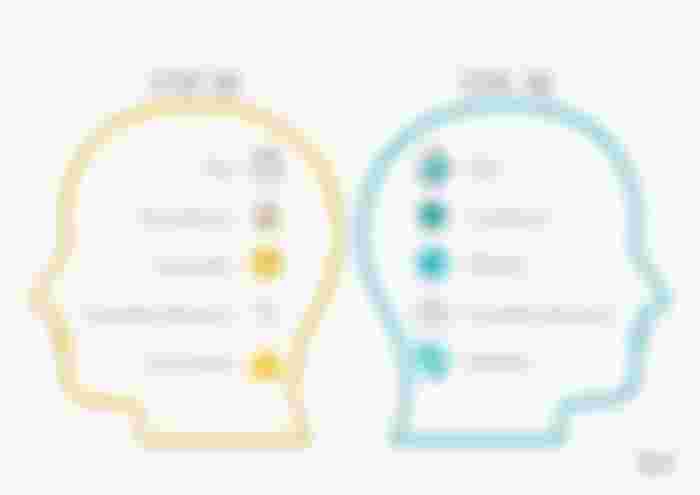The human mind is a powerful tool, with amazing capabilities, that can be used to our benefit or disadvantage. With that, the human mind like the human body is subject to numerous diseases and disorders, and it can be difficult to determine which is which. As such, natural and psychological well-being requires a holistic approach, including physical and mental health, to keep the brain functioning optimally.
Within the world of mathematics, the human mind, otherwise known as the brain or the nervous system, is without doubt something of a miracle. Without the brain, the existence of humans would be impossible. Without the brain, humans could not dream, laugh, love, or even exist. We all know that our mind is much more agile, than our bodies.
No matter what our body does, our mind can stretch its imagination far beyond just the physical. The mind seems to be the only organ among the five, that's made to grow, change, and evolve. And even though our mind is wired to do miraculous things, it has the power to move at the speed of light. But sometimes, it can be difficult to tap into its powers.
Our minds are nothing short of miraculous; the wonders of the human mind will always remain at the forefront of our consciousness. This is why it is so important to keep the brain and mind in top shape. Confusion, fear, negativity, and apathy can all affect our brain and leave us unable to think and solve problems with clarity.

How Our Minds Work
The human brain is truly a work of art. It has created tools and systems to help it accomplish what it needs to survive. We have made weapons to fight off attackers, and machines to help us. The brain has also made the mind, and the mind has made the world. We tend to take for granted what is one of the greatest creations of the brain: the mind.
The mind is constantly working to protect our lives. The mind likes to solve problems. Whenever something happens, your mind starts coming up with possible solutions. If you are attacked, the mind will come up with plans on how to beat or escape from your attacker.
If you have a test to take, the mind will prepare you to know the information, that will be on the test. On a daily basis, our mind is sorting through problems and dangers to come up with solutions. The brain has created a system for managing this important task.
As humans, we are able to think and communicate in amazing ways. We have a system to assign values to different situations and prioritize them. These values can be simple, such as the "risk" of doing something versus the "reward" of doing it. They can be complex, such as the "moral" or "ethical" obligations, that come up in every day life. These systems can be applied to any situation, allowing us to make decisions without even having all the information or without even thinking about it.
Our system for making decisions starts with the five senses. Using all five senses allows us to gather important information about the world around us. This is important, because the brain has a tendency to ignore information, that does not enter our field of view or sense.
The brain also tends to remember information, that is in a particular order. For this reason, our sense of sight is prioritized, since that is the way we experience the world. Our other senses work off of this, with sound taking second place, followed by touch, and finally, taste.
Using Shortcuts To Make Our Lives Easier

The brain has developed a number of shortcuts and heuristics to make life easier. Many of these shortcuts are useful and useful to the point, where they are considered "common knowledge", but there are a few heuristics, that cause problems.
The availability heuristic is a shortcut that causes us to weigh how easily something comes to mind, rather than its actual availability. For instance, if we have a scary thought about jumping off of a high place, we might consider the fact, that we were recently riding on an elevator, which made its way slowly though the same type of building. Because we were in a relatively secure environment, and since the experience was relatively recent and within our own mind, we might come to the conclusion, that elevators are safe to use. However, this is not necessarily the case.
Another heuristic is the representative heuristic. This occurs when we consider the individual that comes to mind, when we think about a certain type of person or thing. For example, if we think about a student, that is very book smart but socially inept, the student that comes to mind is probably someone we know. This is different from the stereotype, which is the mental image, that most of us have of students in our heads, regardless of if we know them or not.
Stumbling Blocks Of Our Minds
There are several things, that get in the way of our brains working the way they should. They can be anything that distracts or gets in the way of our capabilities, but they tend to fall into three main types.
Distraction: Distraction refers to any source of stimuli, that draws our attention away from what we are trying to focus on. This could be anything. Sounds, people, thoughts, and even external forces can all be distractions. This can be a minor annoyance, that doesn't interfere with your ability to think, or a major source of disruption.
Internal forces: Internal forces are those things, that get in the way of our own goals and plans. For example, our thoughts can be a major source of internal forces. Most of the time, these are things we are trying to ignore or force out of our head.
Outside forces: Outside forces are anything, that are not a direct threat to us, but still get in your way. Examples of this would be things like loud noise, or anything, that could cause us physical harm.
The Brain And Intelligence

The brain is the most complex and intriguing organ in the entire body. It does many things, but for now, we are only concerned with the brain's role in intelligence.
Intelligence is a complicated thing. It is not just a result of how much does the brain weigh, or the size of certain parts, or the complexity of connections between nerve cells. There are many standards used to determine intelligence, and no two people seem to agree on what the perfect definition of "intelligent" is. However, there are some general factors, that tend to be involved.
One of the main factors in intelligence is the size of the brain's neocortex. The neocortex is the part of the brain responsible for processing and understanding information. This is not the only factor, of course, but it is a factor.
Another factor, that tends to be involved is how recently the brain has formed. This is known as the "development period" and it refers to how long it takes for a brain to reach its full capabilities. The earlier a brain is developed, the more information can be dealt with. This is a major factor in determining how smart a brain is. However, the brain is not the only thing needed for intelligence, but that could be a topic for another article. (If you are interested in this topic, write an article and tag me so I can read it.)
Better Problem Solving: A Benefit Of The Insight Of The Mind
There are several benefits to having a better understanding of the mind. These benefits can be expanded to other areas as well, but they all revolve around using our mind to solve problems and challenges that we face in life.
Better problem solving may seem like an obvious benefit. The fact is though, problem solving is a very broad category and can include a large variety of things. The main types of problems, that can be solved with insight into the mind are those relating to intelligence, knowledge, and recovery.
Intelligence: Intelligence is what it says on the tin. The higher your intelligence, the greater your intelligence, and the more intelligent you are going to be in practically every area, that requires higher intelligence.
Knowledge: Knowledge is similar, in that the more you know, the better equipped you are to deal with any situation. This is especially important when it comes to surviving and dealing with life in general. Anything that requires you to know something can be greatly improved by just having more knowledge of it.
Recovery: Finally, there is recovery. The more of a "spring" a person has in their step, the more capable they are of getting up after being knocked down. This applies to physical springs as well as mental. The more resilient a person is, the better they will be able to handle hardships and keep going.
Thank you for reading!







Our mind is so powerful, we are useless if we did not used our minds